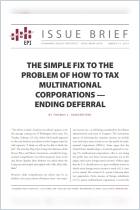Melden Sie sich bei getAbstract an, um die Zusammenfassung zu erhalten.

Melden Sie sich bei getAbstract an, um die Zusammenfassung zu erhalten.
Dhammika Dharmapala
The Economics of Corporate and Business Tax Reform
CESifo Group Munich, 2016
Was ist drin?
To understand why companies like Apple hold vast amounts of cash overseas, read this timely report.
Recommendation
Corporate tax reform is a hot topic in today’s US political environment. Professor Dhammika Dharmapala looks at how America’s corporate tax structure has led to multiple anomalies, such as the practice of firms keeping earnings offshore and relocating their headquarters abroad for tax reasons. Dharmapala’s analysis looks purely at the economic aspects of corporate taxes, omitting the more controversial political facets, but it provides a useful framework for reform. getAbstract believes policy makers and business executives would benefit from this informative report.
Summary
About the Author
Dhammika Dharmapala is a law professor at the University of Chicago.



















Comment on this summary